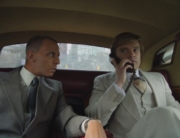Mary Harron, a veteran of offbeat biopics about pop artist Andy Warhol (I Shot Andy Warhol), 1950’s pinup model Bettie Page (The Notorious Bettie Page), and notorious cult leader Charles Manson (Charlie Says), would seem the perfect director for Dalíland, the new biopic about superstar surrealist artist Salvador Dalí’s final years. Yet the film rarely transcends superficiality.
Partly to blame is the screenplay by Harron’s husband, John Walsh, which views Dalí and his longtime muse and wife, Gala, through the eyes of James, a young assistant in the Manhattan gallery that represents the famous artist, beginning in 1974. (Gala would die eight years later, and Dalí would follow her in 1989.) After he starts working with the artist—to try and keep Dalí focused on his upcoming exhibit—James witnesses (and soon becomes part of) Dalí’s exuberantly hedonistic lifestyle as the artist and Gala host ever more extravagant parties in their suite at midtown Manhattan’s St. Regis Hotel, which is filled with the hangers-on and sycophants who have insinuated themselves into their lives. They include such unlikely guests as glam-rocker Alice Cooper. Now in his early 70s, Dalí enjoys being a celebrity instead of a relevant artist.
Meanwhile, James has to fend off Gala’s crude sexual advances, of which his gallery boss has forewarned him, since he’s a “pretty boy,” in Dalí’s own approving parlance. Dalí himself watches as James has a threesome at one of his parties—although James feels betrayed by this violation, the entire matter is unceremoniously dropped. It’s too bad that, even during such hedonistic displays, the fictitious James remains a rather dull stand-in for viewers—and it doesn’t help that he is played wanly and inexpressively by Christopher Briney. It’s too bad that neither Alice (Mark McKenna) nor Jeff Fenholt (Zachary Nachbar-Seckel)—the lead in the musical Jesus Christ Superstar, whom Gala befriends in her highly sexual way—is the audience’s surrogate, instead of being relegated to a few amusing scenes. Both characters are far more compelling than James, but the filmmakers seem to have been reluctant to further explore these men’s relationships with Dalí and Gala.
As it is, whenever Dalí or Gala are not onscreen, Dalíland becomes a routine chronicle of the 1970s New York art scene, which is surprising coming from the maker of the colorful I Shot Andy Warhol. Neither Ben Kingsley nor Barbara Sukowa—both usually so impressive—are particularly persuasive as the leads. Kingsley, who hides behind Dalí’s distinctively eccentric moustache, gives more of an impression and not an interpretation, while Sukowa finds little nuance in Gala and is reduced to playing an older sexpot. The script and performances only hint at the couple’s tangled relationship.
In desperation, Harron adds a few half-hearted flashbacks, where we witness the young Dalí and Gala meeting for the first time, as well as the genesis of Dalí’s most famous painting, the melting watches and clocks of The Persistence of Memory (1931). Even here, surface-level gazing instead of surreal and chaotic imagery reigns: James and the elder Dalí appear, watching these scenes unfold in what may well be a tongue-in-cheek A Christmas Carol homage—or not.
In the movie’s funniest line of dialogue (unintentional, one hopes), young Gala looks at her husband’s soon-to-be-iconic painting and swooningly proclaims, “No one who sees this painting will ever forget it.” It’s the kind of obvious underlining that Harron has avoided in her past biopics, but is more the unfortunate rule than the exception in Dalíland.







Leave A Comment